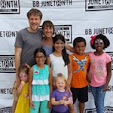The Most Racist Movie I've Watched
In a course at Kansas State University on the Civil War, we watched excerpts of D.W. Griffith's Birth Of A Nation, which glorifies the Ku Klux Klan. I've never seen Gone With The Wind and have no desire to do so. I was uncomfortable upon noticing that the opening scenes in nearly every Dirty Harry movie featured people of color as minor villains. I have always seen John Wayne as more of a caricature than a hero. But racism is most insidious when it resembles a bikini-clad porn star: covered just enough to get past the gatekeepers.
The most racist movie I have watched, from beginning to end, is Sex And The City (2008). And although some incongruities were obvious when I accompanied The Lady to see it, not until recently did I realize just how wrong it was. Although I found Sex And The City 2 (2010) intolerably stupid, the first movie remains more disturbing.
The movie functions as a coda to the wildly-popular six-season show on HBO. Executive-produced by Michael Patrick King, it was once characterized as "a show about 4 women acting like gay men." Contemporary criticism initially focused on the show's obsession with fashion and appearance, belief that shopping can cure all emotional ills, sex-positive dialogue, and attempt to merge blatant pornography with sex columnist Carrie Bradshaw's contemplations on modern love and life.
But then another problem became apparent - not with the sex, but the city. New York City is portrayed as at least 95% white, the exceptions being a few nameless people of color who perform menial work for the white people. A Black man is briefly introduced in Season 3 as an interest of the sex-addicted Samantha, but his family rejects her because she's white. (So now you know: there are a few Black people in New York, and they are the real racists!) For all the show's purported realism, Michael Patrick King portrayed a city that seems to exist only in his imagination: a place filled with upper-class white people who are always available for sex.
Perhaps Mr. King and his bevy of writers - all of whom were either straight women or gay men - felt guilty about this. So they added a Black character to the movie, Louise. For the (minor) role, they cast Jennifer Hudson, a talented singer with magnetic presence who stole the show in Dreamgirls (2006) but struggled to capitalize on her early success. Thus she finds herself interviewed by Sarah Jessica Parker (as Carrie Bradshaw).
"So you're from St. Louis?"
"Yes, Louise from St. Louis."
"And you have a degree in computer science - well, good for you, I can barely text. And... have you ever been a personal assistant?"
"No, but I'm the oldest of six kids, so I'm sure I can handle anything you got."
They discuss her family and living situation, and then...
"Why did you move to New York?"
"To fall in love. [pauses] Does that sound corny?"
What computer science graduate, male or female, says that their career goal is "to fall in love?" Software engineers don't talk like that. Engineers or scientists of any variety don't talk like that. She sounds like a dreamy pre-teen who can hardly wait for her first school dance, not a young woman who graduated in a challenging major and moved to the finance capital of the world.
And why isn't she working for an investment bank, or a consulting firm, or in tech or media? The iPhone was released 18 months before this movie - did she consider creating an app? Why can't a computer science graduate in New York City find any work other than organizing Carrie Bradshaw's email?
Because she's a Black woman - thus, she is expected to be a white woman's servant, and to aspire to nothing beyond that.
And what becomes of Louise? Does she find her success and sex in the city? No. She gives up and goes back to where she came from. Before leaving, she eats with the 4 white women upon whom the show centers, resulting in a painfully awkward scene. She is literally the 5th wheel, conspicuous and yet superfluous.


0 Comments:
Post a Comment
<< Home